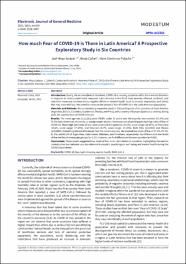How much Fear of COVID-19 is There in Latin America? A Prospective Exploratory Study in Six Countries

View/
Download
(application/pdf: 338.5Kb)
(application/pdf: 338.5Kb)
Date
2021-12-02Author(s)
Moya-Salazar, Jeel
Cañari, Betsy
Contreras-Pulache, Hans
Metadata
Show full item recordAbstract
Introduction: During the unprecedented lockdown, COVID-19 is causing people to suffer from mental disorders in response to strict containment measures. Latin America is the third most severely affected continent, and restrictive measures can have many negative effects on mental health (such as anxiety, depression, and stress) that may arise with fear. We aimed to measure the spread of fear of COVID-19 in the Latin American population.
Materials and Methods: We conducted a prospective study in 535 participants of six countries of Latin America (Argentina, Bolivia, Colombia, Guatemala, Mexico, and Peru), and a country of Europe (Spain) as a control, during 2020. We used the Fear of COVID-19 Scale.
Results: The mean age was 31.2±13.2 years (70.8% under 30 years) and the majority were women (57.9%) and 76.6% had a technical, university, or postgraduate studies. Seven percent of participants had high rates of fear of COVID-19, these high estimates of fear were observed in Argentines (14.3%, score range: 28-31%), of Peruvians
(10.2%, score range: 27-35%), and Mexicans (5.7%, score range: 27-29%). Both Peru (p=0.003) and Mexico (p=0.0001) showed significant differences from the control country. We showed low levels of fear in 57.1%, 45.5%, 42.9%, and 41.2% of Argentines, Colombians, Bolivians, and Peruvians, respectively. No differences in low levelsof fear we found among age groups (p> 0.05), however, we find differences between genders (p=0.001).
Conclusions: These results suggested low levels of fear in six Latin American countries, highlighting the need to contextualize fear behavior as a key element in people’s psychological well-being and mental health during the COVID-19 pandemic.
Collections
- SCOPUS [380]

